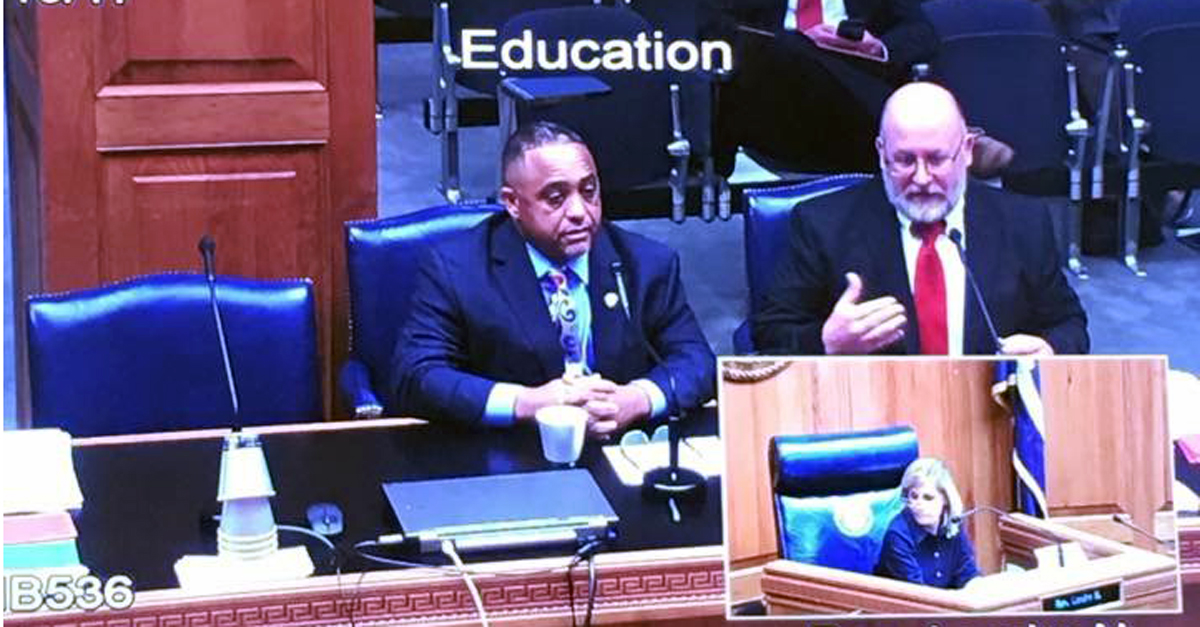
On May 18, 2017, several bills I have been involved with were heard in the House Education Committee. One particular bill, HB-536, has been my personal labor of love for more than seven months. The bill, sponsored by Rep. Vincent Pierre, was intended to protect students from discrimination and punishment when their parent makes a decision to exclude them from state assessments. I began drafting the bill in late August 2016 after realizing that I had amassed a significant number of complaints from parents across the state detailing their experiences with their school districts when they attempted to opt-out their children from statewide assessments. Many, if not most, districts handle this situation with the utmost respect to parents and students; however, some of the complaints I received were horrifying.

Members of the SWLA delegation were on hand to support Conner and gave him a tour of the House and Senate.
At some point, HB-536 became an integral part of a situation that occurred in my own parish. The family opted to appear before the House Education Committee to tell their story and ask the committee to support the bill. Admittedly, their situation is mild compared to some of the complaints I received. It should be noted that regardless of the severity, these things should not happen. It is unfortunate that overemphasis on testing, and Louisiana’s interpretation of federal law, places parents in an unnecessary position of conflict with schools.
I want to use this opportunity to explain the events leading up to the committee meeting. In its original form, the bill sought to address the huge conflict between schools and parents by excluding students from the school’s SPS score when a parent submits a signed request to exclude their child. This was met with huge push back from various organizations. The most frequent response was, “We have to hold schools accountable. Parents depend on assessments to exercise ‘Choice’ in making decisions about their children’s education.” My standard response to that is “Accountable to who? Parents, right?” Here are two totally disregarded facts that are two sides of the same coin.
- If a parent “chooses” to exclude their child from state assessments, they have already made their educational choice and used some method of assessing the school other than the state assessment.
- If a parent absolutely relies on the assessment to make educational choices, they will certainly see to it that their child takes the test.
Those are rather simple, undeniable facts. Nonetheless, when we sought to meet with the Louisiana Department of Education, they insisted on the removal of all things related to accountability. As I explained to Rep. Vincent Pierre, the bill’s sponsor, the central most important part of the bill is to protect the students. If we had to remove the effort to insulate the school, then so be it. So, we did.
By the time the bill reached the committee, it had been reduced to two simple provisions. 1.) Don’t hurt the kids. 2.) Don’t force them to stay in the testing room. Unbelievably, nine organizations, that claim to put children first, objected to the bill.
- Stand for Children (SFC)
- Louisiana School Boards Association (LSBA)
- Council for a Better Louisiana (CaBL)
- Louisiana Family Forum
- Louisiana Association of Business and Industry (LABI)
- Baton Rouge Area Chamber (BRAC)
- Education’s Next Horizon
- Democrats for Education Reform (DFER)
- Responsive Education Solutions
I want to point out that Louisiana Family Forum reached out to us stating they while they were in attendance, they did not oppose the bill and are not happy that it was read into the record that they did. I should also note that the LSBA supported the bill until the provisions to reduce conflict between schools and parents were removed. At that time, their primary objection was manpower to accommodate the children. I believe this is an invalid concern because in elementary schools, only 3rd, 4th and 5th grades are testing. Someone is watching the other grades, and those students can be easily accommodated in those classrooms. At the middle school level, because of computer-based testing, the grades do not test at the same time. As for the remaining opposition, it appears that they are in favor of discrimination.

It is difficult for me to understand how so many people can be in agreement that children should not be discriminated against, or mistreated, and then be okay with having them sit in the testing room, with a test booklet, creating an internal conflict in the child between obeying the parent and obeying the teacher. In hindsight, I am convinced that I could have reduced the bill to simply saying “Don’t harm the children,” and these groups would have opposed it. One of the parent attendees (wearing an organization shirt) was appalled when a representative of her organization got up to oppose the bill.
In the end, Rep. Pierre and I conferred with committee member Rep. Patricia Haynes-Smith, and agreed that a resolution would be in order. Pierre voluntarily deferred the bill in lieu of a resolution to make it incumbent upon school boards to create a policy that fosters relationships with the populations they serve, and Scott Richard (LSBA) agreed to work with us in creating the resolution.


It is not a surprise that the same organizations opposed to this bill which sought to prevent the punishment of children who don’t take the test are the same who vociferously support the use of this test for high stakes decisions (labeling and withholding pupil progression for poor test performance) which produces a punitive result. Were the test not high stakes, it would be used constructively by the teacher and student for analysis leading to improved instruction by the teacher and understanding & learning by the student. If all parents understood the difference between testing resulting in punishment rather than enhanced learning they would probably all opt out. Unfortunately educational systems have not progressed from the many years of a standardized letter grade system to one that requires teachers to analyze and explain student learning and to understand how to effect improvement. Of course in public education funding is limited making it more difficult w large class sizes and structured time frames, but it is possible and is successfully practiced in some schools throughout the nation. We need to return education to qualified professional educators and untie their hands.